Gladiator II (2024): they deserved better | merecían algo mejor
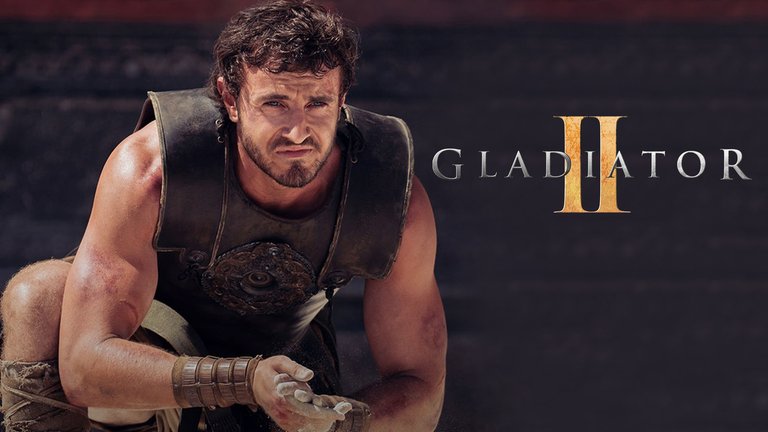
Protagonizada por Paul Mescal, Pedro Pascal y Denzel Washington
It's always difficult to make a sequel, especially when the original has been very successful. It's not just a question of box office expectations or audience reception, but also of preserving the spirit of the story, of the characters that made that film what it was. But when the center of the original film, the protagonist, is not continued in the sequel, it becomes even more difficult to create a story that is on par with that one.
Siempre es difícil hacer una secuela, especialmente cuando la obra original ha tenido mucho éxito. No es sólo un tema de expectativas de taquilla o de recepción del público, sino también de conservar el espíritu de la historia, de los personajes que hicieron que esa película fuese lo que fue. Pero cuando el centro de la película original, el protagonista, no tiene continuidad en la secuela, se hace todavía más cuesta arriba conseguir una historia a la misma altura, una que resulte equiparable a esa.
Gladiator is one of the best films, not only of the last twenty-five years but also of the history of cinema, largely thanks to Russell Crowe's impeccable performance and that heroic character that is Maximus Decimus Meridius, commander of the Armies of the North... and well, you know how it goes. Within these great epic films, characters like Leonidas in 300, William Wallace in Braveheart, or Maximus himself in Gladiator are unrepeatable for their strength, their dedication and especially their sacrifice. The death of the hero elevates him in the eyes of the public who mourns his loss but is grateful for his fight and elevates him almost as a deity; 300 men fought against the Persians, but their king was only one; one who was worth the other 299. So from the start, Gladiator II had to face a major challenge: the absence of Maximus. Added to this is the fact that 24 years have passed since the release of Gladiator, which has served to further mythologize the film as a cinematic - and narrative - gem that is very difficult to match. And finally, we also have the disappointment of director Ridley Scott's previous film, the biopic Napoleon, which was criticized for the lack of a better script and for a large number of historical inaccuracies. Gladiator II is also more or less a historical film, making use of real names and places, which in this case were used quite freely.
Gladiator es una de las mejores películas, no sólo de los últimos veinticinco años sino también de la historia del cine, en gran parte gracias a la impecable actuación de Russell Crowe y a ese heroico personaje que es Maximus Decimus Meridius, comandante de los Ejércitos del Norte... y bueno, ustedes saben cómo sigue. Dentro de estas grandes películas épicas, personajes como Leonidas en 300, William Wallace en Braveheart, o el propio Maximus en Gladiator son irrepetibles por su fuerza, su entrega y en especial su sacrificio. La muerte del héroe lo eleva ante los ojos del público que lamenta su pérdida pero agradece su lucha y lo encumbra casi como una deidad; 300 hombres pelearon contra los persas, pero su rey fue uno solo; uno que valía por los otros 299. Así que de partida, Gladiator II debía enfrentar un desafío mayúsculo: la ausencia de Maximus. A ello se suman los 24 años que pasaron desde el estreno de Gladiator y que han servido para mitificar aún más la película como una joya cinematográfica - y narrativa - muy difícil de igualar. Y por último también tenemos lo decepcionante que fue la película anterior del director Ridley Scott, la biopic Napoleon, que fue criticada por falta de un mejor guión y por una gran cantidad de imprecisiones históricas. Gladiator II también es más o menos una película histórica, hace uso de nombres y lugares reales que, en este caso, fueron usados de manera bastante libre.
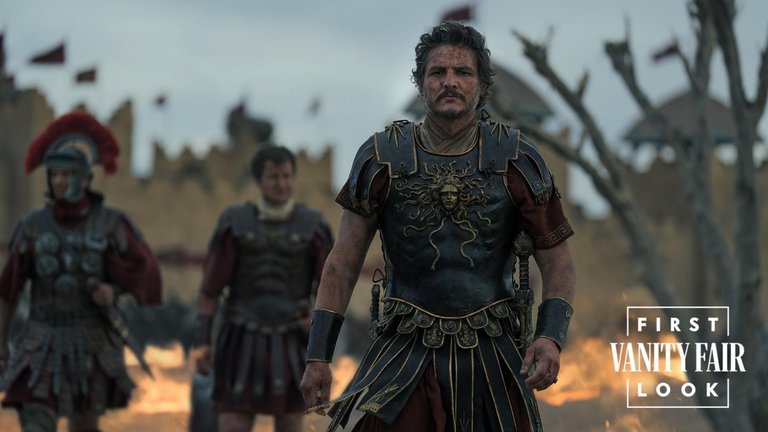
In a nutshell, the plot of Gladiator II is summed up in the story of Hanno (Paul Mescal), a soldier from the city of Numidia who falls in battle before the might of the Roman army, led by General Marcus Acacius (Pedro Pascal). In the battle, Hanno loses his wife and is captured as a slave and then sold to a gladiator merchant named Macrinus (Denzel Washington) who makes him fight for his benefit in the coliseum by promising him that he will deliver to him the head of General Acacius, responsible for the disappearance of his people and the death of his wife.
En pocas palabras, la trama de Gladiator II se resume en la historia de Hanno (Paul Mescal), un soldado de la ciudad de Numidia que cae en batalla ante el poderío del ejército romano, guiado por el general Marcus Acacius (Pedro Pascal). En la batalla, Hanno pierde a su esposa y es capturado como esclavo y luego vendido a un comerciante de gladiadores llamado Macrinus (Denzel Washington) quien lo hace luchar para su beneficio en el coliseo prometiéndole que le entregará la cabeza del general Acacius, responsable de la desaparición de su pueblo y la muerte de su esposa.
That being said, it's a typical story of the weak against the powerful, yet another revenge story where the hero is full of anger and pain, but it still seems right next to the abuses and tyrannies of the rulers, in this case the brothers Geta and Caracalla, who don't think about the welfare of their people, but about their own amusement. So far, so good, it's not a very original story, but it could have worked as an epic struggle. The problem was how to link this film to the prequel, and my question is, was there a need to do so? Couldn't they have told a story independent of that one? The fact is that they didn't want to do that, but preferred to frame these events just 16 years after the death of Emperor Marcus Aurelius in the first film and connect them to the protagonist. Because Hanno is not Hanno; he is Lucius, the son of Lucila... and Maximus. From what is shown in the film, it seems that Hanno does not remember it, or does not know it (but how could he not know if he was twelve years old when the previous film ended?), but at first he hates Rome for bringing destruction everywhere and ends up waging a kind of crusade for the salvation of the empire (?); in a conversation with his mother Lucila, who recognizes him (how? just maternal instinct?) Hanno speaks to her out loud and denies his mother and Rome, but then forgives her and hugs her (?) and when he finally has the opportunity to sign his revenge and kill General Acacius, he doesn't do it: he recognizes him as the hero that he is (?)
Dicho así, se trata de una historia típica del débil contra el poder, una historia más de venganza en la que el héroe está lleno de ira y de dolor, pero sigue pareciendo justo al lado de los abusos y las tiranías de los gobernantes, en este caso los hermanos Geta y Caracalla, que no piensan en el bienestar de su pueblo, sino en su propia diversión. Hasta allí, bien, no es una historia muy original, pero podía haber funcionado como lucha épica. El problema era como enlazar esta película con la precuela, y mi pregunta es ¿había necesidad de hacerlo? ¿no podían haber contado una historia independiente de aquella? El caso es que no quisieron hacer eso, sino que prefirieron enmarcar estos eventos apenas 16 años después de la muerte del emperador Marco Aurelio en la primera película y conectarlas con el protagonista. Porque Hanno no es Hanno; es Lucius, el hijo de Lucila... y de Maximus. Por lo mostrado en el film, parece que Hanno no lo recuerda, o no lo sabe (pero ¿cómo no va a saberlo si tenía doce años cuando terminó la película anterior?), pero al principio odia a Roma por llevar la destrucción a todas partes y acaba librando una especie de cruzada para la salvación del imperio (?); en una conversación con su madre Lucila, quien lo reconoce (¿cómo? ¿sólo instinto maternal?) Hanno le habla en voz alta y reniega de su madre y de Roma, pero luego la perdona y la abraza (?) y cuando finalmente tiene la oportunidad de firmar su venganza y matar al general Acacius, no lo hace: lo reconoce como el héroe que es (?)
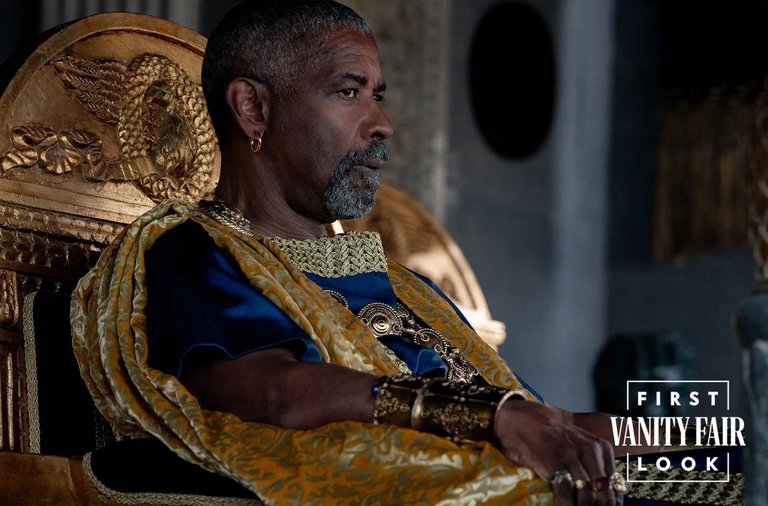
Pedro Pascal's character is interesting because he's a soldier in the service of Rome who questions his emperors and wants the best for the people. In addition, he is Lucila's new husband and that puts him on the side of the good guys. Denzel Washington's character is quite intriguing, somewhat unpredictable at times (for his acquaintances, but not for the spectators who know how to recognize this type of character) and much of the central plot is woven thanks to his interventions. Needless to say, the acting of the three protagonists is wonderful, both Denzel and Pedro and Paul Mescal himself act quite well.
El personaje de Pedro Pascal resulta interesante por ser un soldado al servicio de Roma que a su vez cuestiona a sus emperadores y que quiere lo mejor para el pueblo. Además, es el nuevo esposo de Lucila y eso lo pone en el lado de los buenos. El personaje de Denzel Washington es bastante intrigante, algo impredecible a veces (para sus conocidos, no para los epectadores que saben reconocer a este tipo de personajes) y mucho del centro de la trama se teje gracias a sus intervenciones. Sobra decir que la actuación de los tres protagonistas es maravillosa, tanto Denzel como Pedro y el propio Paul Mescal actúan bastante bien.
But the latter was let down by the scriptwriters. Hanno is a cliché character, with a few interesting moments, but he doesn't have the strength of a Maximus, or a Leonidas. I believe Hanno as an army leader, as a great warrior, but not as an heir to the throne of Rome, not as a man worthy of wearing Maximus' armor no matter how much of his blood runs through his veins. If we add to that Mescal's Irish accent (which I like a lot, but which is out of place here), the scenes in which it seems that the editing was very abrupt (as if they had filmed a lot more dialogue and had taken it out of the final shot) and the constant reinforcement of the connection between this film and its prequel (as if by mentioning Maximus a lot, or showing scenes from that film, one could magically make this sequel a better film), Gladiator II is an entertaining film, with good fight and battle scenes and little else. I didn’t look into whether it’s historically correct in what it tells, but it’s sure to have more than one flaw in that area (whose idea was it to put sharks in the Coliseum? Sharks? Yes, sharks!) and it’s a shame because they really managed to bring together three great actors for the central roles, who performed wonderfully well, but who in my opinion, deserved a better script, and Maximus deserved a better heir. Have you seen Gladiator II? What did you think? I’ll read you in the comments.
Pero a este último le fallaron los guionistas. Hanno es un personaje cliché, con uno que otro momento interesante, pero no tiene la fuerza de un Maximus, o un Leonidas. Me creo a Hanno como líder de un ejército, como un gran guerrero, pero no como un heredero al trono de Roma, no como un hombre digno de portar la armadura de Maximus por mucha sangre suya que le corra por las venas. Si a eso le sumamos el acento irlandés de Mescal (que a mí me gusta mucho, pero que aquí queda fuera de lugar), las escenas en las que parece que la edición fue muy abrupta (como si hubieran filmado mucho más diálogo y lo hubieran sacado de la toma final) y el constante reforzamiento de la conexión entre esta película y su precuela (como si por mencionar mucho a Maximus, o mostrar escenas de aquella cinta, se pudiera por arte de magia hacer de esta secuela una película mejor), Gladiator II resulta una película que entretiene, que tiene buenas escenas de lucha y de batalla y poco más. No investigué si es históricamente correcta en cuanto a lo que cuenta, pero de seguro que tendrá más de una falla en ese terreno (¿de quién fue la idea de meter tiburones en el Coliseo? ¿tiburones? sí, ¡tiburones!) y es una lástima porque realmente lograron juntar a tres grandes actores para los papeles centrales, quienes actuaron maravillosamente bien, pero que en mi opinión, merecían un mejor guión, y Maximus merecía un mejor heredero, ¿ya vieron Gladiator II? ¿qué les pareció? Los leo en los comentarios.
Reseñado por @cristiancaicedo
Other posts that may interest you | Otros posts que pueden interesarte:
 |
|---|
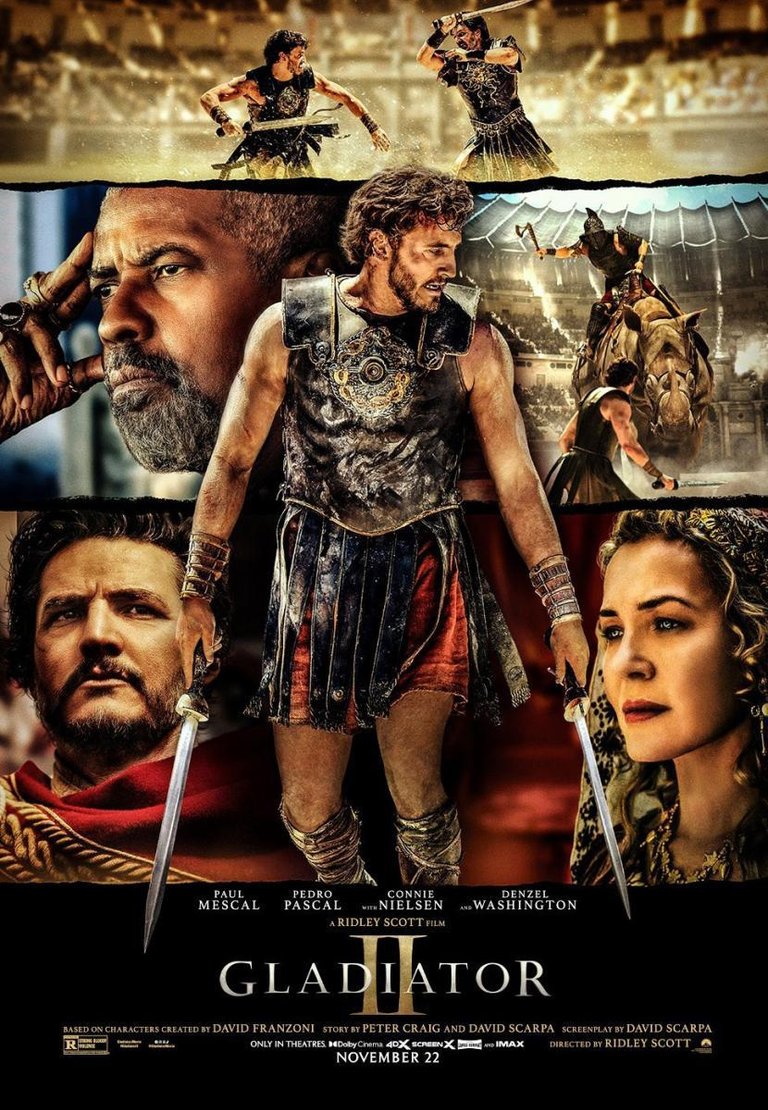
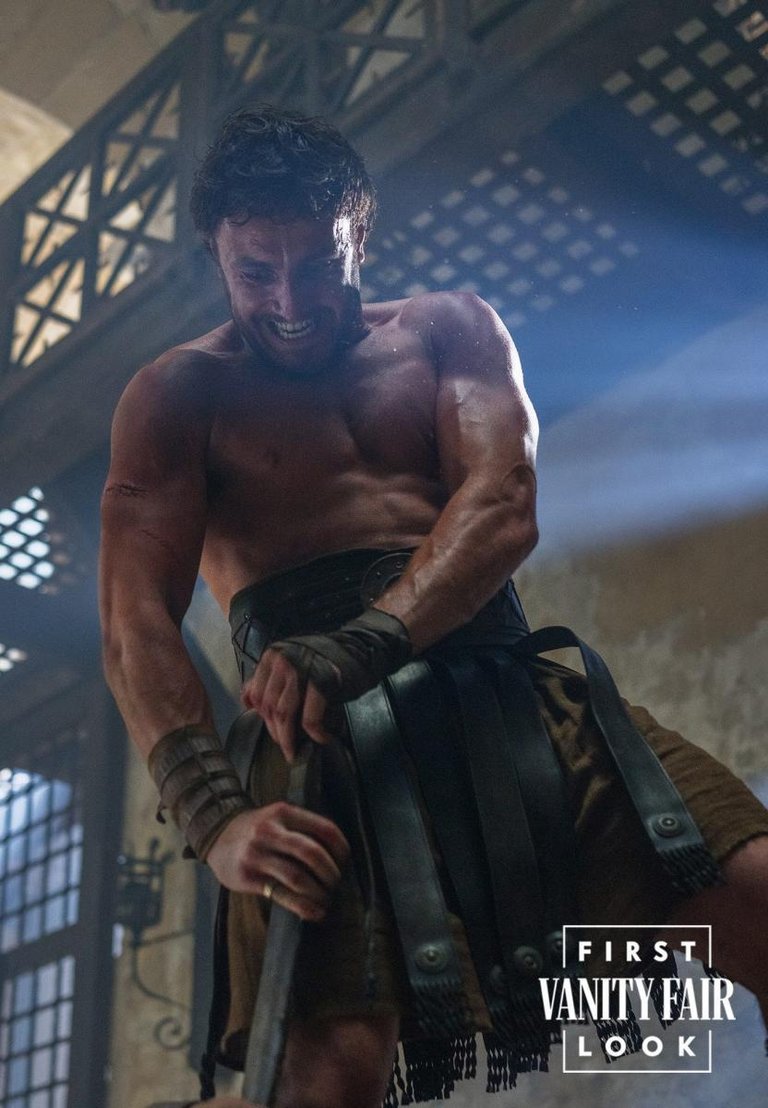
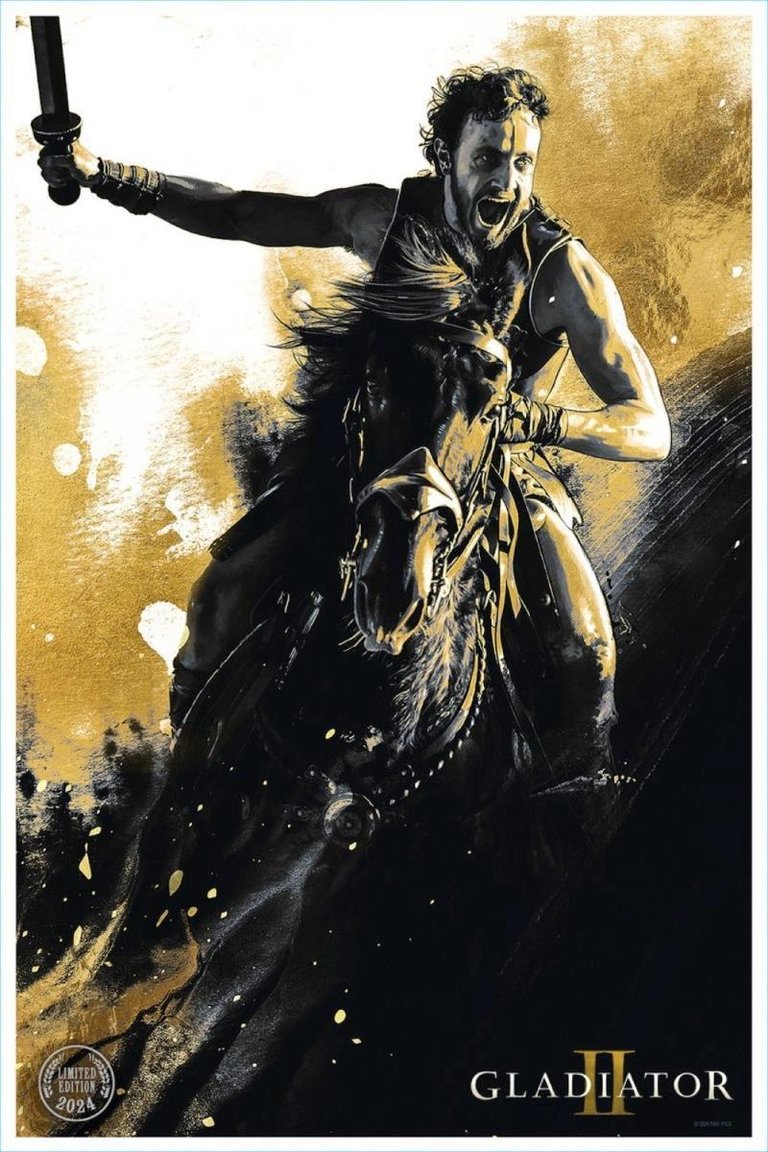
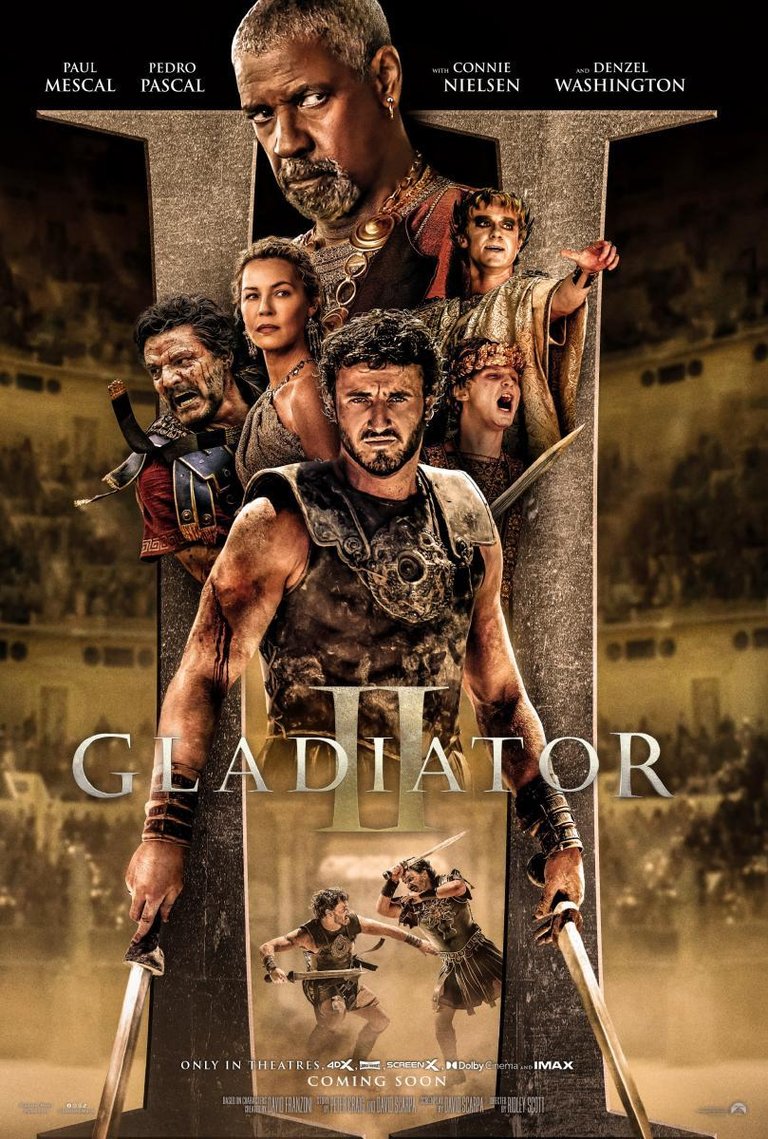
Por lo que nos comunicas en tu excelente reseña crítica, este filme no le llega ni por los tobillos a Gladiador</>, sin duda, uno de los mejores filmes de Ridley Scott. Aunque su obra maestra me sigue pareciendo Blade Runner. De verlo, será solo con ánimo de entretenimiento. Saludos, @cristiancaicedo.
¡Felicidades! Esta publicación obtuvo upvote y fue compartido por @la-colmena, un proyecto de Curación Manual para la comunidad hispana de Hive que cuenta con el respaldo de @curie.
Si te gusta el trabajo que hacemos, te invitamos a darle tu voto a este comentario y a votar como testigo por La Colmena.
Si quieres saber más sobre nuestro proyecto, te invitamos a acompañarnos en nuestro servidor de Discord.
una historia interesante, buena reseña!
interesting story, good review!
ya me imaginaba que no iva a tener el mismo impacto que la primero pero almenos parece
Es un gran reto hacer una secuela de una película tan icónica como la original. Estoy de acuerdo en que los personajes deben tener sustancia, y parece que Hanno no logra ese impacto. ¡Gracias por compartir tu opinión!